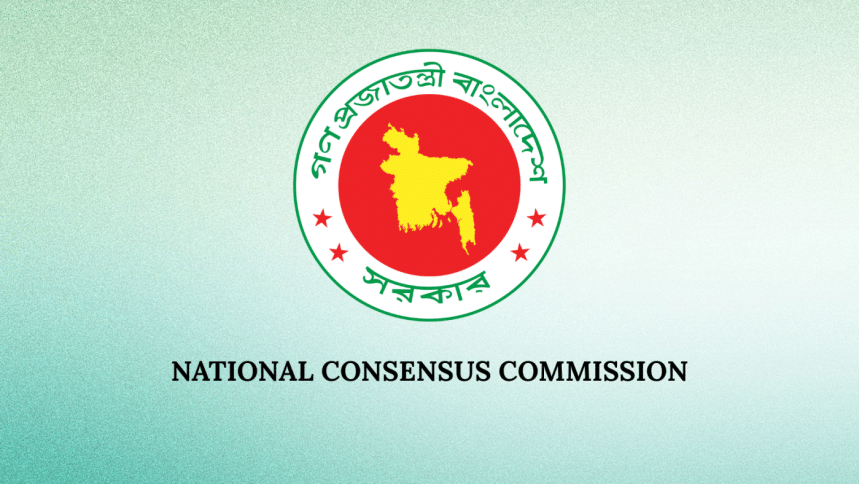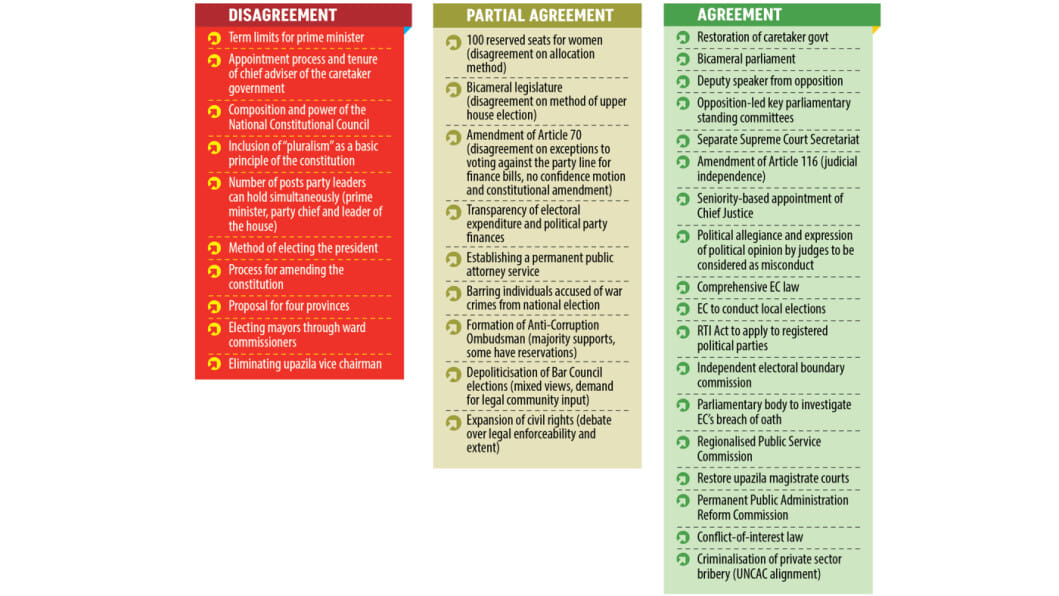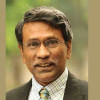National consensus commission: Breakthrough on core reforms

Major political parties have reached consensus on a wide range of reforms, yet divisions persist over some key issues, setting the stage for the next round of talks expected to begin within days.
Parties agreed to reinstate the non-partisan caretaker government system, though disputes remain over its formation and tenure, and the mechanism for appointing the chief adviser.
There is also alignment on forming a bicameral legislature with a 100-strong upper house and granting the Deputy Speaker role to the opposition, regardless of the structure of the parliament.
The method of electing upper house members, such as via proportional representation or regional votes, remains unresolved, while some parties still prefer the current unicameral system.
Prof Ali Riaz, co-chair of the consensus commission, said that while full consensus is unlikely, discussions will continue to bridge the remaining gaps.

He was speaking at a briefing at the LD Hall of the National Parliament Building yesterday.
Riaz expressed optimism that a "National Charter" summarising areas of agreement can be finalised by July after the second round of talks, beginning by the end of May or the first week of June.
The commission also plans to engage the National Bureau of Statistics to conduct a survey in order to gather public feedback on some of the key proposals.
After 45 meetings of the commission with 33 political parties, at the centre of the discord lies a proposal to limit the powers of the prime minister, specifically, barring any individual from simultaneously holding the posts of prime minister, party chief, and Leader of the House.
Political parties are also sharply divided over the proposed formation of a "National Constitutional Council" to oversee key appointments and legal standards. Parties disagreed on the constitutional council's composition and powers.
While parties broadly agree on elevating "equality, human dignity, social justice, and democracy" as state principles, the term "pluralism" as a fundamental principle of the constitution failed to gain consensus.
Beyond the proposal to limit the prime minister's authority, parties are split over imposing term limits on the prime minister, restricting how many posts the prime minister can hold, and the method for electing the president.
Judicial independence has garnered strong support. All parties back the creation of a separate Supreme Court Secretariat, amending article 116 of the constitution to transfer the powers for appointment, posting, promotion, and disciplinary control of judges from the executive to the Supreme Court.
Proposals to form a permanent attorney service under government employment and appoint the chief justice from the senior most judges of the Appellate Division were also broadly endorsed.
There is also full agreement on introducing accountability mechanisms to discipline judges exhibiting political bias and to establish post-retirement conduct codes for them.
Additional proposals, such as strengthening the Appellate Division, regulating presidential clemency powers through a Clemency Board, and bringing transparency to judicial appointments, were also widely supported.
The proposal to depoliticise bar council elections by denying official status to politically affiliated lawyer panels drew mixed responses. While some parties backed the idea, others insisted that the legal community must be consulted before moving forward.
The recommendation to bar individuals accused of war crimes from running in parliamentary elections received partial support, with many parties seeking a deeper legal review before any legislative changes.
Reform of article 70, currently prohibiting MPs from voting against party lines, saw support with a limit on its scope to confidence votes, constitutional amendments, and money bills.
All parties supported reserving 100 seats for women in the lower house, though opinions vary on how those seats should be allocated.
The parties share the view that key parliamentary committees should be placed under opposition control, including those overseeing public accounts, estimates, and government undertakings.
On anti-corruption, all parties endorsed granting the Anti-Corruption Commission constitutional status, ensuring its transparency, independence and accountability. Most parties favour creating an Anti-Corruption Ombudsman to oversee the implementation of a national strategy on corruption, although a few parties remain partially supportive on this front.
There is unanimous backing for enacting a conflict-of-interest law, as well as bringing public service operations under full automation.
Another key point of agreement is the criminalisation of bribery in the private sector, aligning with international standards under the UN Convention Against Corruption.
In electoral reform, the majority of parties support the enactment of a comprehensive law governing the Election Commission.
There is also full agreement that the Election Commission should oversee local government polls and that political parties should be subject to the Right to Information Act.
The proposal to establish a separate, independent commission for electoral boundary delimitation also received strong backing.
A shared view has emerged around allowing a parliamentary committee to investigate and initiate legal proceedings against election commissioners who violate constitutional responsibilities.
Public administration reform also found relative convergence.
Most parties favour forming a commission to investigate officials involved in electoral fraud, corruption, or killings and torture during the July 2024 uprising.
Proposals to separate audits from accounts, restructure the Public Service Commission into three regional units, and restore local magistrate courts at the upazila level were widely welcomed.
All parties agreed on revising outdated laws such as the Official Secrets Act of 1923 and modernising the Right to Information Act.
Most parties also support allowing direct election of mayors in municipalities and forming a permanent Public Administration Reform Commission.
Reform of the local government structure also sparked debate.
A proposal to reorganise Bangladesh into four provinces and abolish district councils failed to gain much traction.
Most parties also rejected the idea of electing mayors through ward commissioners instead of a direct public vote, and the suggestion to eliminate the upazila vice chairman post was broadly unpopular.
Disputes also remain over which civil rights to expand and how strongly the state should be bound to enforce them.
Additionally, the very process of amending the constitution continues to be contested.

 For all latest news, follow The Daily Star's Google News channel.
For all latest news, follow The Daily Star's Google News channel. 








Comments